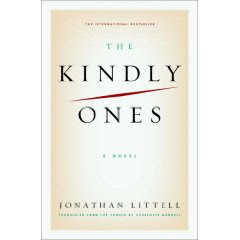Jonathan Littell (born 10 October 1967 in New York) is a bi-lingual (English / French) writer living in Barcelona. He is a dual citizen of the USA and France and is of Jewish background. His first novel written in French, Les Bienveillantes (2006), won two major French awards, the 2006 Prix Goncourt and the grand prix du roman of the Academie Francais. It is just about to be pulished in the UK under the title "The Kindly Ones", shared with one of the wartime novels in Anthony Powell's Dance to the Musuc of Time. he book has attracted substantial praise, but has also proved controversial as a result of its approach to the holocaust from a Nazi perspective. Nonetheless, it is an important novel - the British historian, Antony Beever, reviewing it in the The Times called it "a great work of literary fiction, to which readers and scholars will turn for decades to come." A signed copy of the UK first edition (just about to be released) should be a good investment.
"Oh my human brothers, let me tell you how it happened." So begins the chilling fictional memoir of Dr. Maximilien Aue, a former Nazi officer who has reinvented himself, many years after the war, as a middle-class family man and factory owner in France. Max is an intellectual steeped in philosophy, literature, and classical music. He is also a cold-blooded assassin and the consummate bureaucrat. Through the eyes of this cultivated yet monstrous man, we experience in disturbingly precise detail the horrors of the Second World War and the Nazi genocide of the Jews. During the period from June 1941 through April 1945, Max is posted to Poland, the Ukraine, and the Caucasus; he is present at the Battle of Stalingrad and at Auschwitz; and he lives through the chaos of the final days of the Nazi regime in Berlin. Although Max is a totally imagined character, his world is peopled by real historical figures, such as Eichmann, Himmler, Göring, Speer, Heyrich, Höss, and Hitler himself.
A supreme historical epic and a haunting work of fiction, Jonathan Littell's masterpiece is intense, hallucinatory, and utterly original. Published to impressive critical acclaim in France in 2006, it went on to win the Prix Goncourt, that country's most prestigious literary award, and sparked a broad range of responses and questions from readers: How does fiction deal with the nature of human evil? How should a novel encompass the Holocaust? At what point do history and fiction come together and where do they separate?”
"Oh my human brothers, let me tell you how it happened." So begins the chilling fictional memoir of Dr. Maximilien Aue, a former Nazi officer who has reinvented himself, many years after the war, as a middle-class family man and factory owner in France. Max is an intellectual steeped in philosophy, literature, and classical music. He is also a cold-blooded assassin and the consummate bureaucrat. Through the eyes of this cultivated yet monstrous man, we experience in disturbingly precise detail the horrors of the Second World War and the Nazi genocide of the Jews. During the period from June 1941 through April 1945, Max is posted to Poland, the Ukraine, and the Caucasus; he is present at the Battle of Stalingrad and at Auschwitz; and he lives through the chaos of the final days of the Nazi regime in Berlin. Although Max is a totally imagined character, his world is peopled by real historical figures, such as Eichmann, Himmler, Göring, Speer, Heyrich, Höss, and Hitler himself.
A supreme historical epic and a haunting work of fiction, Jonathan Littell's masterpiece is intense, hallucinatory, and utterly original. Published to impressive critical acclaim in France in 2006, it went on to win the Prix Goncourt, that country's most prestigious literary award, and sparked a broad range of responses and questions from readers: How does fiction deal with the nature of human evil? How should a novel encompass the Holocaust? At what point do history and fiction come together and where do they separate?”






No comments:
Post a Comment